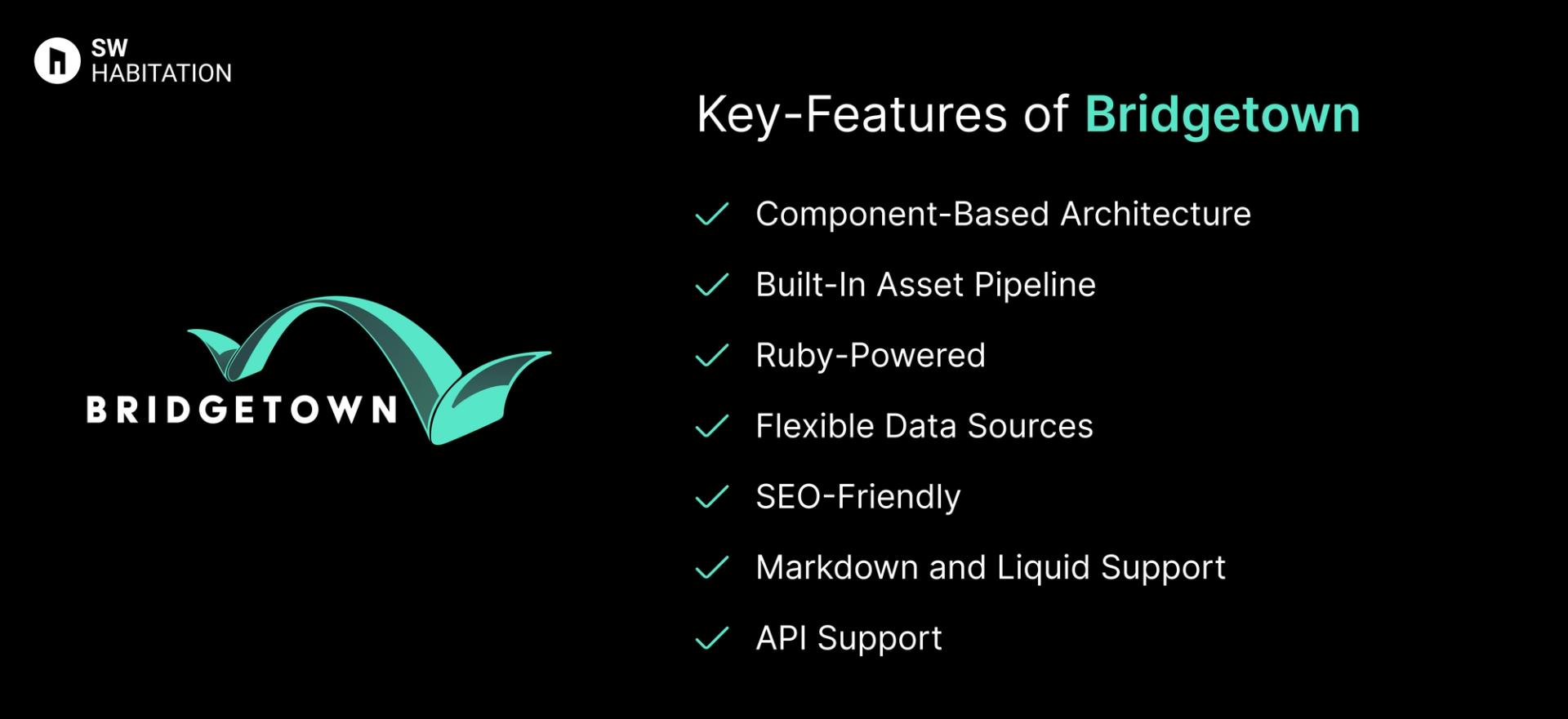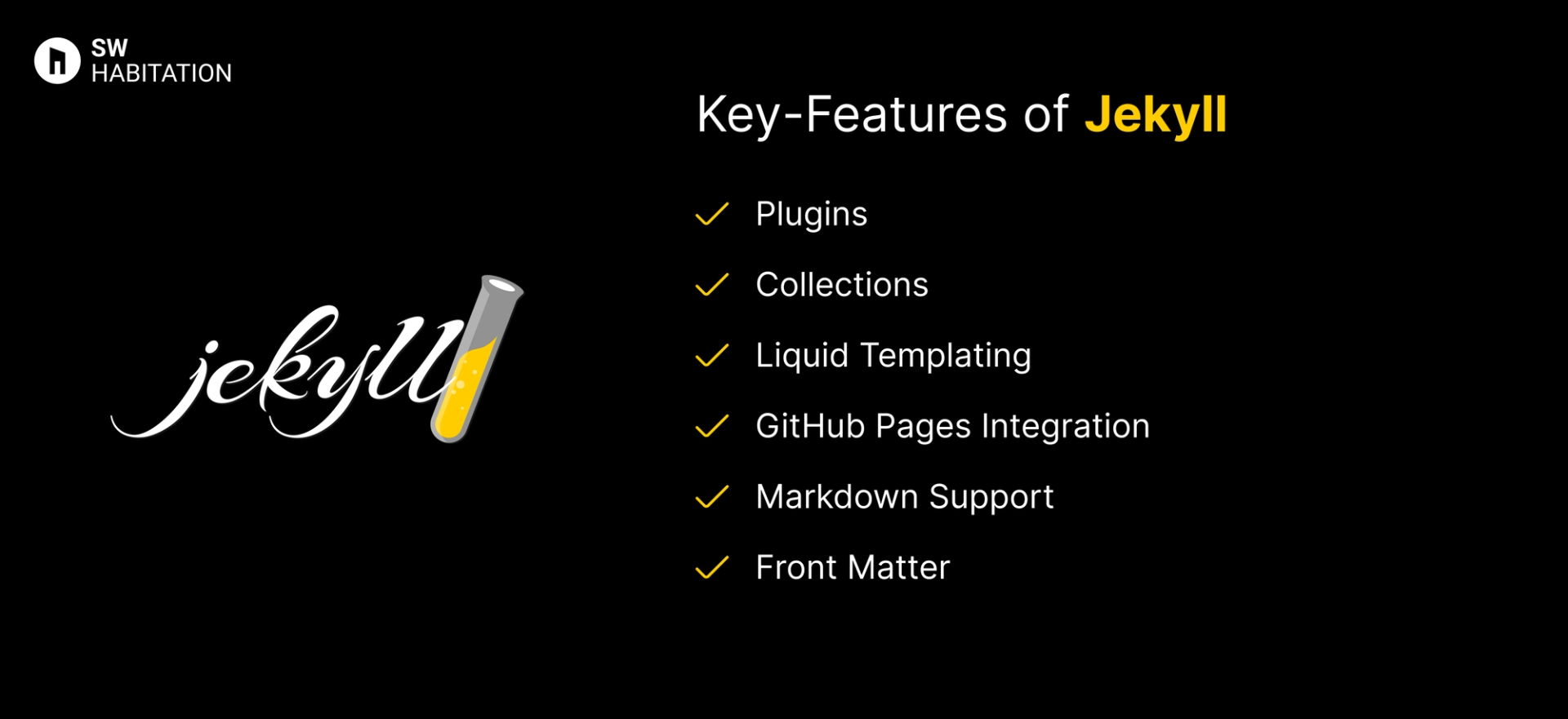Bridgetown vs. Jekyll

Bridgetown

Jekyll
Have you ever been to a website that loads super fast? Chances are it uses an SSG (Static Site Generator). It’s a tool that builds your site ahead of time, so when someone visits, they get the page instantly. No waiting around for things to load it’s just there.
What is Bridgetown ?
Bridgetown is a static site generator built with Ruby.
It is designed to help developers create fast, modern websites with ease. It’s often seen as the spiritual successor to jekyll, with a fresh take on static site generation. Bridgetown combines the power of Ruby with a modern development workflow, supporting things like webpack, dynamic content with APIs, and flexible templating options.
Key Features of Bridgetown


- Component-Based Architecture: It supports reusable components for cleaner code.
- Built-In Asset Pipeline: It integrates with webpack for managing assets like CSS and JavaScript.
- Ruby-Powered: It leverages the simplicity and power of Ruby.
- Flexible Data Sources: It pull content from YAML, JSON, CSV, or external APIs.
- SEO-Friendly: It generates clean, semantic HTML with built-in SEO optimisations.
- Markdown and Liquid Support: It writes content in Markdown and use liquid for templating.
- API Support: It fetches dynamic content from APIs while keeping the site static.
Advantages of Bridgetown
- Extensible: Custom plugins and extensions for advanced use cases.
- Fast and Lightweight: Generates static HTML for quick load times.
- Great for Ruby Developers: Familiar tooling and language.
- Easy Content Management: Ideal for blogs and documentation sites.
- Powerful Templating: Supports Liquid, ERB, and other templating engines.
Disadvantages of Bridgetown
- Ruby Knowledge Required: Best suited for Ruby developers.
- Smaller Community: Compared to older SSGs like Jekyll, the community is still growing.
- More Setup: Requires setting up a Ruby environment, which may be unfamiliar to non-Ruby developers.
What is Jekyll?
Jekyll is an open-source static site generator built with Ruby. It takes your text files (written in Markdown), processes them through templates, and generates a static website that you can deploy anywhere.
No databases, no server-side scripting it just pure HTML, CSS, and JavaScript. It’s super popular among developers, especially for creating personal blogs and documentation sites.
Key Features of Jekyll


- Plugins: Extend functionality with a rich plugin ecosystem.
- Collections: Organize content beyond just posts and pages.
- Liquid Templating: Use Liquid, a simple templating language, to customize your site.
- GitHub Pages Integration: Seamless deployment on GitHub Pages.
- Markdown Support: Write content in Markdown, and Jekyll handles the rest.
- Front Matter: Easily add metadata like titles, tags, and layout options.
Advantages of Jekyll
- Highly Customizable: Tweak layouts, templates, and styles to make the site your own.
- Active Community: Tons of tutorials, plugins, and themes to explore.
- Simplicity: No database, no backend — just Markdown and templates.
- GitHub Pages Friendly: Direct integration with GitHub Pages means free hosting and automatic deployment.
- Perfect for Blogs: Designed with blogging in mind, making it easy to manage posts.
Disadvantages of Jekyll
- Build Times: For very large websites, build times can get a bit slow compared to newer tools.
- Limited Dynamic Content: Since it’s static, things like user authentication or live updates need extra work.
- Requires Ruby: You’ll need Ruby installed on your system, which can be a hurdle for some.
Comparison Between Bridgetown vs Jekyll
Use Cases of Bridgetown
- Content-Driven Sites: Great for blogs, documentation sites, and portfolios.
- Ruby Lovers: If Ruby is your jam, you’ll feel right at home.
- Small Projects with Big Potential: Clean structure and fast build times make it a good fit for smaller projects that may grow.
- Custom Workflows: Offers flexibility in handling assets and external data sources.
Use Cases of Jekyll
- Portfolios: Showcase your work with a simple, fast, and customizable site.
- GitHub Projects: The perfect companion for project documentation hosted on GitHub.
- Documentation Sites: Clean, simple, and easy to organize docs.
- Personal Blogs: Its blogging-focused features make it a favorite for tech blogs.
Other Resources
Conclusion
Static Site Generators are a big game changer if you’re looking to build a website that’s fast, secure, and easy to maintain. Whether you’re launching a personal blog, portfolio, or a business website, they give you the freedom to focus on what really matters, your content and your users without all the extra complexity.
The best part? You’re not locked into one way of doing things. You can choose the tools and tech you’re most comfortable with, and scale things up as your site grows. From lightning-fast load times to better SEO and easy hosting, SSGs make the whole process smoother.
At the end of the day, it comes down to what fits your workflow and goals best. Pick the one that feels right to your requirements, and you’ll be well on your way to creating a beautiful, high-performing website that you’re proud of 🙌
Frequently asked questions
Is Bridgetown actively maintained?
Yes, Bridgetown has an active community, and it’s regularly updated with new features and bug fixes. You’ll always have access to the latest updates.
Is Bridgetown content-friendly?
Yes, It works well with Markdown, custom components, and layouts, so you can easily create structured content.
Is Bridgetown only for Ruby devs?
Yes, Bridgetown is built for Ruby developers and works well with the Ruby on Rails ecosystem. If you’re familiar with Ruby, you’ll love its seamless integration.
Is Bridgetown a good Jekyll alternative?
Bridgetown is a modern alternative to Jekyll, with a more flexible architecture, faster build times, and improved plugin support.
Is Jekyll easy to set up?
Yes, Jekyll is developer-friendly and has great documentation. However, it does require Ruby and some command-line usage to set up and deploy.
Can I host Jekyll on GitHub Pages?
Yes, Jekyll integrates seamlessly with GitHub Pages, allowing you to host your site for free directly from your GitHub repository.
Does Jekyll require a database?
No, Jekyll is file-based, meaning your content is stored as Markdown or HTML files. It compiles everything into static files, so there’s no need for a database.
What is Jekyll good for?
Jekyll is perfect for building blogs, documentation sites, portfolios, and personal websites. It’s highly optimized for Markdown and Liquid templating.
